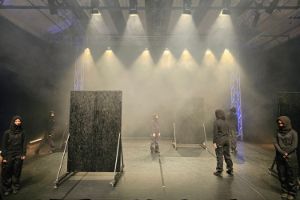Treffen junge Szene
Dance
Selbstgespräche
AERIALS Ensemble
Pottporus e. V., Herne, North Rhine-Westphalia

Selbstgespräche © private
In the dance piece “Selbstgespräche” (“Self-Talks”), eight dancers explore core questions of identity and self-perception: Who am I without others? Who am I within my group? Who do I want to be? And above all: Who am I when no one is watching?
The production shines a light on the inner conflicts and confrontations that arise when we engage with our own selves. At its centre are self-talks, the internal dialogues that often occur unconsciously but have a significant influence on how we think and act. These inner voices link conscious thoughts with subconscious beliefs, attitudes, and emotions. They help us interpret situations, make decisions, and solve problems.
This piece reveals how such self-talk can be made visible and tangible on stage and what it means when that inner voice is marked by doubt or negativity.
Through movement, expression, and body language, the dancers give a powerful form to this inner struggle. The performance invites the audience to enter the world of internal experience and reflect on the role of self-reflection, self-doubt, and inner strength. What emerges is a sensitive yet powerful portrayal of the fight with one’s own inner voice.
Jury Statement by Daniela Rodriguez Romero
Darkness. Black walls. Bodies and faces cloaked in shadow move silently across the stage. A scream. A rupture. A tentative attempt to break free...
With “Selbstgespräche” (“Self-Talks”), the AERIALS ensemble from Herne has created a powerful and deeply moving piece of dance theatre. It takes on a phenomenon that affects us all—especially many young people—yet is rarely spoken about: our inner dialogues, the circling of thoughts, the solitary struggle within ourselves.
The stage becomes a resonance chamber for the invisible. The black walls that the dancers run toward are more than a set—they serve as a physical metaphor for mental barriers. Particularly striking is the ensemble’s spatial awareness: there are no marked paths, no defined boundaries. And yet, through strong coordination and intelligent use of props, they navigate the space—physically, narratively, and choreographically.
What we witness is an authentic and artistically refined engagement with a theme deeply rooted in the lived experiences of the performers. The ensemble approaches it with openness, curiosity, and the courage to share their own inner monologues and mental landscapes. What unfolds on stage is a reflection of inner conflict. A release for what goes unspoken. A call to pay attention—to listen closely and without judgment.
The choreography gives shape to the pressure of persistent thoughts, the struggle for clarity, the boundaries of the inner world—and what happens when these internal realities encounter others. “Selbstgespräche” maintains a clear and coherent dramaturgical arc. The shift from dark, oppressive imagery to a tone that opens toward hope feels organic and never forced. The performers allow themselves to be emotional—and in doing so, they show true strength without hardening.
And they remain anchored in their core theme: the influence of inner voices on how we think, feel, and act—in all its complexity.
“Selbstgespräche” is a work that challenges, moves, and empowers. It is a highly physical and stylistically rich piece that powerfully demonstrates the artistic depth and expressive capacity of young dancers. A remarkable achievement, which the jury recognises with great appreciation.
Mit
Elisa Aydin, Camila Carvalheiro Busz, Paul Konrad Eikmeier, Anna Ekwueme, Thandie Kröger, Zondiwe Kröger, Karina Lakgaj, Eva Theologou
Miracle Laackmann – choreography
Jacqueline Neuenhausen – choreographic assistance, ensemble director